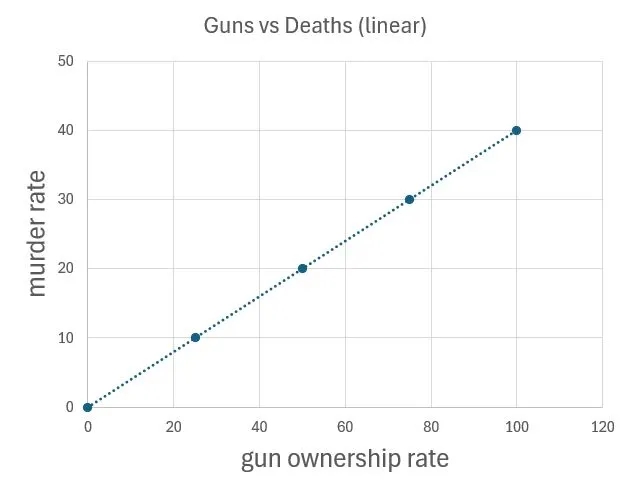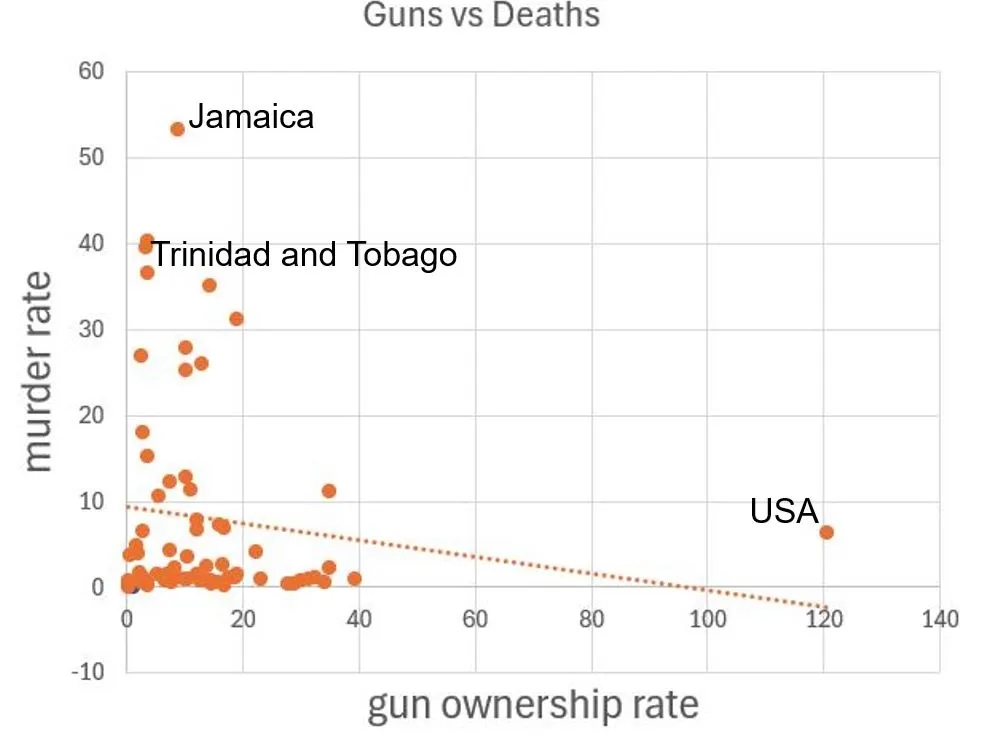

See for Yourself if
Guns Cause Murder

By Rob Morse. May 26, 2024
Article Source
Gun prohibitionists say that gun-control works. They say gun-control laws reduce the number of guns possessed by law-abiding gun owners. They say that is good because guns cause crime. In particular, they say that guns cause extremely violent crimes like murder. I don't know if that is true, but I do know that we can find out. Countries have different cultures and different rules about owning guns. That leads to different rates of gun ownership. Different countries also have different murder rates. Put them together and we can see if guns cause crime.
The data isn't as good as we'd like it to be. The last comprehensive international data on gun ownership was from the Small Arms Survey of 2017. People can update their estimates based on trends. That isn't the same as real survey data taken in the last few years. The other data on murder is from the United Nations Office on Drugs and Crime's Global Study on Homicide. About half the countries are missing when we look at the data on murder rates. Japan and France are glaring examples. I asked a demographer/sociologist about that missing data. She said that many countries do a poor job of sorting out murder, suicide, and defensive homicide. In a perfect study, we'd have worldwide survey data taken in the same year. We don't have that. It turns out that those small errors don't matter in the slightest.
Let's look at the original claims by gun prohibitionists. They said that guns cause crime. More guns cause more crime and fewer guns cause less crime. A simplified version of that data would look like this. Here is what the murder rate would look like when we plot it against the rate of gun-ownership.

That isn't what we see when we look at real data. To be fair, we wouldn't expect real data to look like that. Many factors influence the murder rate. The most obvious is that we've been killing each other long before guns were invented. There is a baseline rate of murder even if there were no guns to be found. Sociologists have looked at rates of crime to find that income, upward income mobility, marriage rate, age of family formation, and rule of law are a few of the most significant factors. We find that other factors dominate the effect of gun ownership when we look at the 70 countries for which we have data.
Here is the plot of the gun ownership rate versus the murder rate. (Guns per 100 people versus the number of murders per 100k people)

We get a slight negative correlation with gun ownership in fact. That is probably an income effect. You need to be relatively affluent to own lots of guns. That wealth comes with high rates of employment and the rule of law. That doesn't look significant to me.
Say what you will, the gun-ownership effect on murder isn't there. We also see countries with very low rates of gun-ownership and frighteningly high murder rates. Violent crime has many causes. More importantly, we see countries with high rates of gun ownership and low murder rates. Those examples show that firearms ownership is not a significant cause of murder. The obvious question is what that means.
I'm a retired engineer rather than a PhD criminologist. I spent an hour putting the data together. If I figured out that guns ownership has an insignificant effect on the murder rate then so did the researchers paid for by anti-gun billionaires. This data means that they knew. It means they lied to please the people who paid them.
Hack through enough datasets and you can find the effect you want. Shame on them. Also, shame on us for giving them any attention and not checking for ourselves.
Please evaluate the data on your own if you think that I'm wrong. Here are the datasets I used. How hard did you need to torture the data to show that guns cause crime?
Sources-
https://worldpopulationreview.com/country-rankings/gun-ownership-by-country
(2022)
https://worldpopulationreview.com/country-rankings/murder-rate-by-country
(2024)
![]()
























